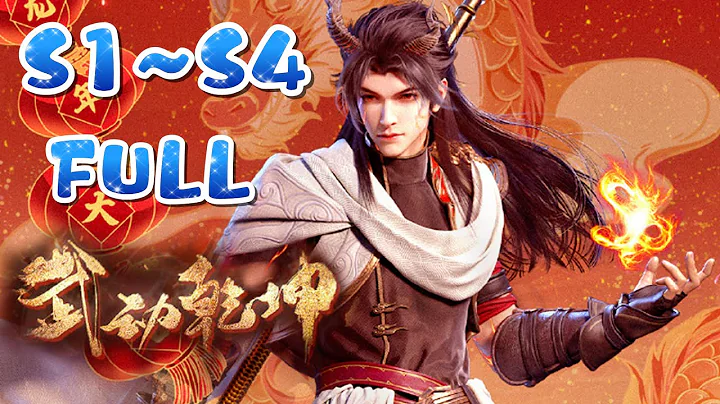
Lao Qin wrote "Is there any natural reason for ?" after New Year's Day this year. The Year of the Tiger is here, but it is the Leopard that is popular. The article discusses a question with great interest: All the Chinese gods have mastered the secret of flying in the clouds and mists, so why do they still need mounts?
Some netizens said that gods own a mount mainly to show their worth and rank. There is some truth to the statement
.
Didn’t you see that today’s big-name celebrities have multiple luxury cars to their names, although they only have one butt and cannot ride in two cars at the same time. These luxury cars are all to show one's worth and rank.
We read "Journey to the West" and watch Guanyin running around. She only needs to ride an auspicious cloud to fly in the wind.
This makes us think that Guanyin has no mount.
However, in the book where Sun Wukong planned to steal the Purple Bell, we learned that she also had a mount - Sai Tai Sui was her mount.
However, in the book about Sun Wukong's Three Adjustments of the Banana Fan, we also saw that in addition to showing one's worth and rank, the mounts of gods also have other magical uses. Isn't
? We watched Bull Demon King duel with Sun Wukong. His methods are comparable to Sun Wukong. He can also go to heaven and earth without the need for a mount.
However, the old dragon spirit from Bibotan in Luanshi Mountain invited him to the Dragon Palace for a banquet, so he mounted his mount, the Water-Bearing Golden Eyed Beast, and went to the banquet leisurely.
Why do we need to ride a mount when going to a banquet?
In addition to showing his worth and rank, he can also be carried home directly by his mount after getting drunk.
You must know that if there is no mount, although the gods can fly in the clouds, they still need to have a clear head, carefully identify the direction, and look for the cloud road, so as not to get lost.
This principle is the same as modern people spending money to hire a driver when they are drunk. Isn't
? We see that Sun Wukong turned into the Bull Demon King. After stepping on the Golden Eyed Beast, the Golden Eyed Beast automatically carried him back to the entrance of the Banana Cave in Cuiyun Mountain without any instructions.
This is the real reason why high-level gods want to own a mount.
Since this is the case, then, as the "leader" in "Journey to the West" - Tathagata Buddha should also have a mount. But what is his mount? The issue of

is not mentioned in "Journey to the West".
In his early years, Lao Qin wrote an article titled "What is the relationship between Tathagata Buddha in Journey to the West and Sakyamuni in Buddhism? ” article. As mentioned in the article, in Buddhism, Tathagata Buddha is Sakyamuni.
"Sakyamuni" is the name of a tribe living in southern Nepal more than 2,000 years ago. This name contains the meaning of "omnipotent" and "unparalleled bravery".
"Muni" is the honorific title given by the Sakyamuni people to those who have achieved great achievements in monk practice, and it means "holy one".
"Sakyamuni" is not a personal name, it refers to "the holy one among the Sakyamuni people".
Who does "the holy one among the Sakyamuni people" refer to?
By analogy, if we say "the saint in Chinese Confucianism", it refers to Confucius .
In the same way, "the holy one among the Sakyamuni people" refers to Gautama Siddhartha.
has explained "Sakyamuni", let's talk about " Tathagata ".
In Indian Sanskrit , "Tathagata" means "Buddha".
In "Diamond Sutra", Gautama Siddhartha made an annotation for "Tathagata": There is nothing from the beginning and nowhere to go.
So, in the classic teachings of Buddhism, Tathagata is Sakyamuni.
We cannot find the answer in "Journey to the West" about what animal the Tathagata rides on. We can find it in Buddhist classics.
It is recorded in the Sutra of Cause and Effect: When Sakyamuni was born into the world, he came riding on a six-tusked white elephant .
It can be seen that Tathagata's mount is a white elephant.
Because of this, in the minds of Buddhists, white elephants are noble mounts. Among Buddhist disciples, only those who have made outstanding contributions are qualified to ride the white elephant.
Master Xuanzang went to Nalanda Temple to copy scriptures and discuss Zen with eighteen masters, and finally won. King Harsha was convinced and arranged for him to ride a white elephant around the city.
In other words, Laos is known as the "Land of Vientiane" - the "Lancang" in the "Lancang Kingdom" in Laos history means "millions of elephants" in Laos.
In addition, most Lao citizens believe in Theravada Buddhism. In 1961, the Lao Constitution stipulated Buddhism as the state religion.
Therefore, when the Lao leader Kaissan Phongvihan visited China in July 1970, Chairman Mao enthusiastically chatted with him about the topics of Sakyamuni, Buddhism and white elephants.

He asked Kaishan Phongweihan and said: "I'm a little confused, where did the name Vientiane come from?"
In fact, although the capital of Laos is translated as "Vientiane" in Chinese (there is also "永利"). "Vieng Chan ວຽງຈັນ"), but in Lao, it is spelled "Vieng Chan ວຽງຈັນ", which actually means "City of Tan Chan".
translates "Vieng Chan ວຽງຈັນ" as "everything", which is neither a transliteration nor a free translation. The only way
can explain it is that "Vieng Chan ວຽງຈັນ" is the capital of the "Kingdom of Vientiane".

Therefore, Kaishan Fengweihan explained vaguely: "Laos is rich in elephants. In the past, kings held celebrations without elephants, especially the most precious white elephants."
Chairman Mao listened with a smile After finishing his answer, he said half-jokingly and half-seriously: "Buddhism is your state religion. Let me ask you a question, what kind of animal did the Buddha usually ride when he went out?"
Kaishan Fengweihan replied hesitantly: "Is it possible? Isn't it riding a white elephant?"
Chairman Mao was happy after hearing Kaishan Fengweihan's answer, and said: "We have an ancient book in China called " Qi Yan Lu ", written by the Sui Dynasty person A collection of jokes written by Bai . There is a joke in it, which tells that during the Northern Wei dynasty of China, a certain eminent monk was preaching on the altar. Suddenly, a man stood up and interrupted him and asked: How does the Buddha usually do? What kind of animal does he ride on when he goes out? The eminent monk said without hesitation: The Buddha sits on a lotus platform at home, and rides on a white elephant when he goes out. Cow, not a white elephant. The eminent monk was shocked when he heard this and asked: Is this recorded in the Buddhist scriptures? The man plausibly said: The Buddhist scriptures say that the Buddha has a "peculiar voice", and the "Jade Pian" says that "special" refers to cows. Isn't 'strange' just riding a bull?"
Chairman Mao finished telling the story quoting classics. The other central leaders and foreign guests such as Kaishan Fengweihan who were present all burst into laughter.
Finally, I would like to add that Lu Huixiang, who was working as a stenographer at the time, heard what Chairman Mao said was interesting. He went back to look up "Qi Yan Lu" and wanted to compare the original text of the joke with the original book, but it was like looking for a needle in a haystack, and he couldn't find it no matter how hard he searched.
Later, he turned to an old professor at Peking University and learned that the original book of "Qi Yan Lu" had been lost. The only ones that can be seen today are the remaining Dunhuang volumes and many later editions. kind. He couldn't help but admire Chairman Mao's profound knowledge.
![✨Snow Eagle Lord EP 01 - EP 78 Full Version [MULTI SUB] - DayDayNews](https://i.ytimg.com/vi/2qo1uCVqRJA/hq720.jpg?sqp=-oaymwEcCNAFEJQDSFXyq4qpAw4IARUAAIhCGAFwAcABBg==&rs=AOn4CLDmYR6mh1pow4qHbQqeWMA9vx7Gjg)
![✨Snow Eagle Lord EP 01 - EP 78 Full Version [MULTI SUB] - DayDayNews](https://cdn-dd.daydaynews.cc/img/play.svg)
![✨Perfect World EP 01 - 121 Full Version [MULTI SUB] - DayDayNews](https://i.ytimg.com/vi/4BEXSxEQPO4/hq720.jpg?sqp=-oaymwEcCNAFEJQDSFXyq4qpAw4IARUAAIhCGAFwAcABBg==&rs=AOn4CLCejVvtNs5UGEan_x4y-qONWAQ6eg)

![✨Soul Land EP 01 - 130 Full Version [MULTI SUB] - DayDayNews](https://i.ytimg.com/vi/AtXBtbvNq2c/hq720.jpg?sqp=-oaymwEcCNAFEJQDSFXyq4qpAw4IARUAAIhCGAFwAcABBg==&rs=AOn4CLBOIp4OllfYh1yxt0effNrUko92Lg)
















